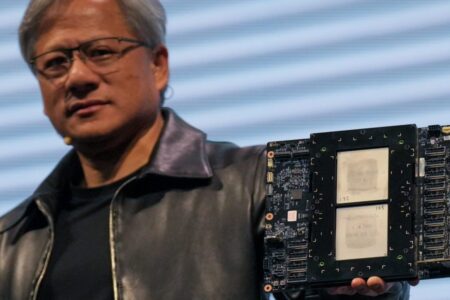Nvidia Corp, the chipmaker at the center of the AI boom, gave another upbeat sales forecast, showing that spending on AI computing remains strong.
The company said on Wednesday that second-quarter revenues will reach about $28 billion. Analysts on average expected $26.8 billion, according to data compiled by Bloomberg. Results in the first fiscal quarter, which ran through April, also exceeded expectations.
“The next industrial revolution has begun,” CEO Jensen Huang said in a statement, echoing one of his favorite themes. “AI will bring significant productivity gains to almost every industry and help companies be more cost and energy efficient, while expanding revenue opportunities.”
The upbeat outlook reinforces Nvidia's position as the biggest beneficiary of AI spending. The company's so-called AI accelerators — chips that help data centers develop chatbots and other sophisticated tools — have become a hot commodity in the past two years, sending their sales soaring. Nvidia's market cap has also risen, surpassing $2.3 trillion.
Shares rose about 4% in extended trading on Wednesday. They're already up 92% this year through the close, driven by investors' hopes that the company will continue to beat expectations.
The Santa Clara, California-based company also announced a 10-for-1 stock split and boosted its quarterly dividend by 150% to 10 cents per share.
Nvidia, which Hwang co-founded in 1993, began as a provider of graphics cards for PC gamers. His realization that the company's chips were well suited to developing artificial intelligence software helped open a new market, giving him a leg up on competitors.
The release of OpenAI's ChatGPT in 2022 sparked a race among major tech companies to build their own AI infrastructure. The rush has made Nvidia H100 accelerators a must-have product. They sell for tens of thousands of dollars per wafer, and are often in scarce supply.
But much of this new revenue came from a small handful of customers. It is a group of four companies – Amazon.com Inc., Meta Platforms Inc. and Microsoft Corp. and Alphabet Inc.'s Google – Nvidia's biggest buyers, accounting for about 40% of sales. Hwang, 61, is trying to expand his bets by producing complete computers, software and services, aimed at helping more companies and government agencies deploy their own AI systems.
In the first fiscal quarter, Nvidia's revenue more than tripled to $26 billion. Excluding some items, profit was $6.12 per share. Analysts had expected sales of about $24.7 billion and profits of $5.65 per share.
Nvidia's data center division – now its largest sales generator ever – generated $22.6 billion in revenue. Gaming chips provided $2.6 billion. Analysts had set targets of $21 billion for the data center unit and $2.6 billion for gaming.
Nvidia confirmed on Wednesday that it wants to sell its technology to a broader market, moving beyond giant cloud computing providers known as hyperscalers. Huang said AI is moving to consumer Internet companies, automakers and healthcare clients. Countries are also developing their own systems – a trend referred to as sovereign AI.
These opportunities “create multiple multi-billion-dollar vertical markets” beyond cloud providers, he said.
However, hyperscalers remained a critical driver of growth for Nvidia last quarter. They generate approximately 45% of the company's data center revenue. This suggests that Nvidia is in the early stages of diversifying the business.
Huang said the company's new chip platform, called Blackwell, has now entered full production. It lays the foundation for generative AI that can handle trillions of parameters. “We are ready for the next wave of growth,” he added.
